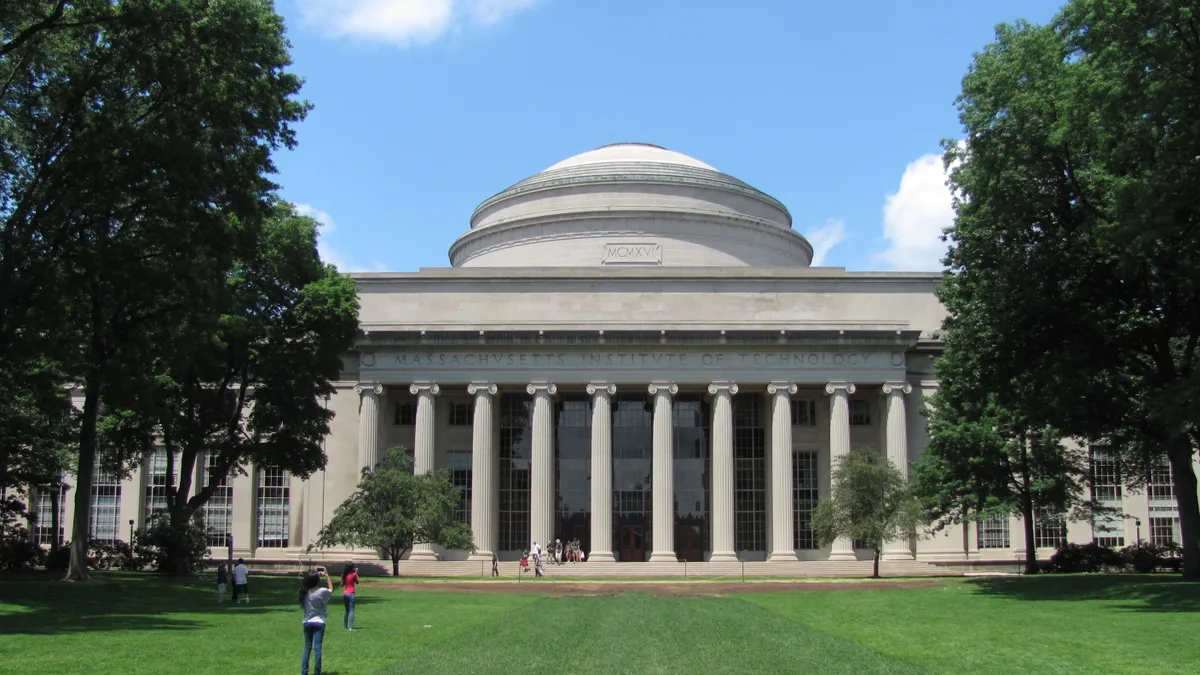Dive Brief:
- Jeffrey Epstein, the notorious financier who was accused of sex trafficking young girls, gave a total of $850,000 to the Massachusetts Institute of Technology over 15 years, according to a report released on Jan. 10 by law firm Goodwin Procter.
- The university hired the firm to investigate its history with Epstein. It uncovered that at least three top university officials knew he was a convicted sex offender for years, but still accepted donations, in part because MIT lacked policies on potentially controversial gifts.
- No one at MIT informed the president, L. Rafael Reif, of Epstein's crimes, the firm found. But a tenured professor has been placed on paid administrative leave after it was found he "purposefully failed" to inform the university that Epstein funded his research in 2012.
Dive Insight:
Since last year, MIT has been the subject of public ire for its ties to Epstein, who ended his life in a New York jail cell in August after being indicted on charges of sex trafficking.
A September article from The New Yorker detailed how officials in MIT's Media Lab, a highly praised research laboratory, deliberately tried to conceal their relationship with Epstein. A day after the piece was published, Media Lab Director Joichi Ito stepped down from the university and several other boards. Two Media Lab researchers resigned prior to Ito, citing his work with Epstein as the reason.
In a letter to the campus in August, Reif offered a "profound and humble apology" to Epstein's victims and pledged to review how the university vets its donations.
Goodwin Procter's four-month review found Epstein made 10 separate gifts to MIT totaling $850,000. Of the donations, $525,000 went to the Media Lab, and $225,000 went to Seth Lloyd, the mechanical engineering professor MIT placed on leave.
Epstein bankrolled Lloyd and his research three times — with two $50,000 donations in 2012 and another $125,000 donation in 2017. But Epstein also gave Lloyd $60,000 sometime between 2005 and 2006, a "personal gift" the report notes, that Lloyd deposited in his personal bank account and did not disclose to MIT.
Investigators found Lloyd viewed the 2012 donations as a test of whether MIT would flag a donation from Epstein.
"Professor Lloyd knew that donations from Epstein would be controversial and that MIT might reject them," the report states. "We conclude that, in concert with Epstein, he purposefully decided not to alert the Institute to Epstein's criminal record, choosing instead to allow mid-level administrators to process the donations without any formal discussion or diligence concerning Epstein."
In a Medium post on Jan. 16, Lloyd pushed back on the firm's findings, saying he followed the proper procedures for accepting donations and that he did not try to conceal the fact that they came from Epstein.
A press release from the university discussing the report notes that following one of Epstein's $50,000 donations to Lloyd, in 2012, Reif signed a "standard gift-acknowledgment letter" letter thanking Epstein for the gift. But according to the report Reif "had no contemporaneous knowledge of Epstein’s donations. There also is no evidence that anyone brought the significance of Epstein or his crimes to President Reif's attention at any time prior to 2019."
Epstein gave directly to the Media Lab six times between 2013 and 2017, but officials rejected a $25,000 donation in 2019 following widespread media coverage of accusations against him.
In 2013, three MIT vice presidents were made aware of Epstein's 2008 conviction in Florida for soliciting a minor for prostitution. As a part of that case, Epstein was forced to register as a sex offender.
The three administrators were R. Gregory Morgan, the former vice president and general counsel; Jeffrey Newton, former vice president for resource development; and Israel Ruiz, executive vice president and treasurer, who announced in December he will leave MIT.
The trio, "acting in good faith, debated whether to accept Epstein's post-conviction donations to the Media Lab," the report states. "They ultimately decided on a compromise solution: accept the donations to support Ito and the Media Lab, while trying to protect the Institute to the extent possible by insisting that such donations remain relatively small and unpublicized, so that they could not be used by Epstein to launder or 'whitewash' his reputation or to gain influence at MIT."
Reif once again wrote to campus on Jan. 10, pinpointing five goals for the university and how it would improve its policies for accepting gifts and address potential abuses of power.
MIT was one of many higher ed institutions that faced a reckoning in the last year or so for accepting money from controversial sources. Past academic donations from the Sackler family, known best for their part in helping develop and peddle the addictive narcotic OxyContin, also came under scrutiny and ultimately led to Tufts University scrubbing the Sackler name from its campus facilities.
This story has been updated with statements from Seth Lloyd.















